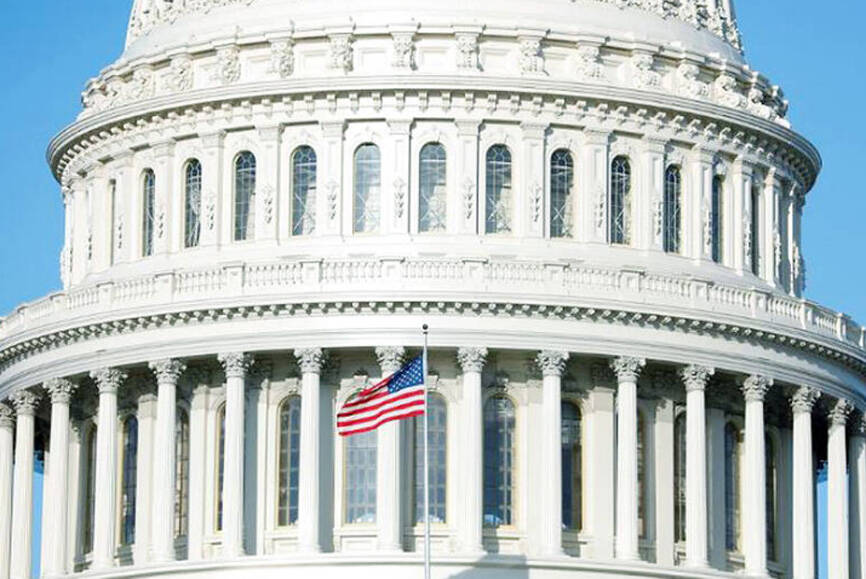The Tax Relief for American Workers and Families Act, which included a tax relief proposal for Taiwanese businesses and workers, failed to pass the US Senate after falling short in a vote on Thursday.
The New York Times reported that Senate Republicans believed they would be in a better negotiating position after November’s election, as they hope to win control of the chamber.
A procedural vote related to the major tax package that would have increased the child tax credit and restored some tax breaks for businesses in the US had 48 votes in favor and 44 opposed, but 60 votes were needed for the measure to overcome the filibuster and pass.

Photo: Reuters
The bill, which was passed with bipartisan support in the US House of Representatives, was opposed by Republicans in the Senate, who were not in favor of expanding the child tax credit.
One part of the bill, the US-Taiwan Expedited Double-Tax Relief Act, established special rules for the taxation of residents of Taiwan with income from sources within the US.
It covered “the reduction of the rate of withholding of taxes, the application of permanent establishment rules, treatment of income from employment, and the determination of the residency of citizens of Taiwan.”
However, the bill also stipulated that because the measure required full reciprocal benefits, “it does not come into full effect until Taiwan provides the same set of benefits to US persons with income subject to tax in Taiwan.”
With the US Congress now in recess, the bill cannot be revisited until lawmakers return next month.
Taiwan has been working with the US on double taxation avoidance.
In May last year, Vice President Hsiao Bi-khim (蕭美琴), who was representative to the US at the time, said that eliminating double taxation was a priority in bilateral negotiations.
Only Taiwan among the US’ top 10 trading partners does not have a bilateral tax agreement with Washington, Hsiao said, calling it “unfair” that Taiwanese companies have to pay higher taxes than other foreign-invested companies in the US.
A Bloomberg report last year said that Taiwanese companies effectively pay a 51 percent tax rate on profits earned in the US, which is at least 10 percentage points higher than companies from South Korea or Australia.
Minister of Economic Affairs J.W. Kuo (郭智輝) discussed the elimination of double taxation during his meeting with US officials in Washington in June.
During the trip, Kuo said that the avoidance of double taxation could help attract Taiwanese small and medium-sized enterprises to invest in the US, and expressed hope that the the tax relief proposal could be passed into law as soon as possible.

US climber Alex Honnold is to attempt to scale Taipei 101 without a rope and harness in a live Netflix special on Jan. 24, the streaming platform announced on Wednesday. Accounting for the time difference, the two-hour broadcast of Honnold’s climb, called Skyscraper Live, is to air on Jan. 23 in the US, Netflix said in a statement. Honnold, 40, was the first person ever to free solo climb the 900m El Capitan rock formation in Yosemite National Park — a feat that was recorded and later made into the 2018 documentary film Free Solo. Netflix previewed Skyscraper Live in October, after videos

Starting on Jan. 1, YouBike riders must have insurance to use the service, and a six-month trial of NT$5 coupons under certain conditions would be implemented to balance bike shortages, a joint statement from transportation departments across Taipei, New Taipei City and Taoyuan announced yesterday. The rental bike system operator said that coupons would be offered to riders to rent bikes from full stations, for riders who take out an electric-assisted bike from a full station, and for riders who return a bike to an empty station. All riders with YouBike accounts are automatically eligible for the program, and each membership account

A classified Pentagon-produced, multiyear assessment — the Overmatch brief — highlighted unreported Chinese capabilities to destroy US military assets and identified US supply chain choke points, painting a disturbing picture of waning US military might, a New York Times editorial published on Monday said. US Secretary of Defense Pete Hegseth’s comments in November last year that “we lose every time” in Pentagon-conducted war games pitting the US against China further highlighted the uncertainty about the US’ capability to intervene in the event of a Chinese invasion of Taiwan. “It shows the Pentagon’s overreliance on expensive, vulnerable weapons as adversaries field cheap, technologically

NUMBERs IMBALANCE: More than 4 million Taiwanese have visited China this year, while only about half a million Chinese have visited here Beijing has yet to respond to Taiwan’s requests for negotiation over matters related to the recovery of cross-strait tourism, the Tourism Administration said yesterday. Taiwan’s tourism authority issued the statement after Chinese-language daily the China Times reported yesterday that the government’s policy of banning group tours to China does not stop Taiwanese from visiting the country. As of October, more than 4.2 million had traveled to China this year, exceeding last year. Beijing estimated the number of Taiwanese tourists in China could reach 4.5 million this year. By contrast, only 500,000 Chinese tourists are expected in Taiwan, the report said. The report